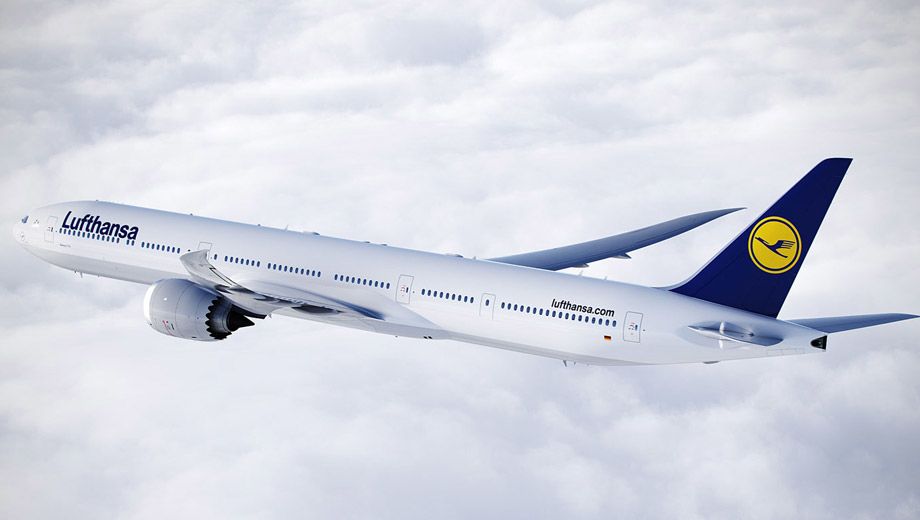Lufthansa is considering stretching out deliveries of Boeing's new 777X aircraft, concerned about the cost and size of the big jet as managers review the airline's fleet needs.
A decision on the new timeline is “urgent” and could be reached by September, according to an internal video presentation by Lufthansa CEO Carsten Spohr. The German airline may take additional Airbus A350 planes, which carry fewer passengers than the 400-seat Boeing jet.
“I’m not sure if we’ve really ordered enough A350s and possibly too many 777Xs,” Spohr said at a staff meeting, a replay of which was seen by Bloomberg. “We must now think about either stretching the 777X in a deal with Boeing to let them come in more slowly, or increasing profitability to finance our overdue fleet investments.”
Bad news for Boeing
The move would be a blow to Boeing, which signed up Lufthansa as a launch customer for the 777X. The aircraft manufacturer has a backlog for the model worth about US$125 billion at list prices, with orders concentrated among airlines that have hit market turbulence recently.
Carriers in the Persian Gulf, where low oil prices are damping economies and sapping demand for travel, account for more than three-quarters of the 306 orders.
Deliveries for the 777X – a new version of Boeing’s existing 777 aircraft that will be the industry’s largest-ever twin-engine jetliner – are due to start in 2020.
Lufthansa spokesman Andreas Bartels said reviewing the order book is daily business for any airline and that the company won’t comment on internal discussions.
And while Lufthansa has planned an all-new business class for its Boeing 777X fleet, Spohr suggested that the new product might not be retrofitted onto aircraft currently in fleet. Also under consideration is a possible "business-plus" cabin rather than a first class on some 777X aircraft.
Demand for big twin-aisle aircraft has weakened since Lufthansa placed an order for the Boeing model in 2013, under Spohr’s predecessor. Cheaper fuel and an industry-wide glut of smaller, relatively young wide-body planes have upended the economics that had favored larger models for long-range flying.
The airline, which has its main hubs in Frankfurt and Munich, is grappling with a shifting aviation market that may have made parts of its orders for 205 aircraft out of step with current trends. Carriers like Norwegian are ramping up cut-rate trans-Atlantic services using long-range narrow-bodies or fuel-efficient aircraft like Boeing’s twin-aisle 787 Dreamliner.
Based on list prices, Lufthansa’s order book translates into average spending of €3.9 billion (US$4.4 billion) a year through 2025. That compares with a budget for about €2.5 billion in annual capital expenditure. The US$408.8 million 777X would eat up almost all of that, but remains necessary to replace older four-engine aircraft, the CEO said.
Revisiting future fleet plans
Spohr’s message, delivered in March, may also have been intended to motivate Lufthansa managers to cut costs. He argued that meager profitability has caused the airline to under-invest in its fleet for two decades.
The aging fleet has left Lufthansa with the highest fuel expenses of any airline in Europe, as it operates almost 100 four-engine gas guzzlers. That includes the largest global fleet of Airbus A340s, a model that has long been out of production.
While Lufthansa ordered 34 777Xs four years ago, 14 of those are "reconfirmable," giving the airline wiggle room to cut spending. The airline also has 20 options.
It has 25 A350s due for delivery and holds options for 30 more. The Airbus plane, which seats 293 people and costs about $100 million less, is interesting for long-haul routes frequented by fewer passengers, reducing the need to bundle traffic at large hubs.
These capabilities could make long-haul services from Dusseldorf, Hamburg and Berlin viable for Lufthansa’s Eurowings budget subsidiary, Spohr said.
Lufthansa has also indicated that it may lease a larger proportion of its fleet and buy more used models to curb expenditures. The carrier said last month that it will replace most of the long-haul planes flown by its Belgian arm and opt for used aircraft.
“Generally speaking, there for sure will be good deals in the coming years,” Spohr said in the video. “Airbus and Boeing have sold far too many aircraft to the Gulf.”

11 Dec 2015
Total posts 85
With some airlines potentially balking at larger 400-seat planes (even two-engine types), it will be interesting to see what Qantas does, especially given they're already in a downsizing frame of mind (789 replacing 744s, cutback on A380 numbers)
31 Mar 2016
Total posts 621
Alternatively, might QF be tempted to have a few 778s as their largest type once the 380s are gone, with an expanded fleet of 787 for the bulk of their widebody fleet sharing the common cockpit crew rating(i.e. same cockpit crew pool) with any 777 variant?
Hi Guest, join in the discussion on Lufthansa could slow deliveries of Boeing 777X